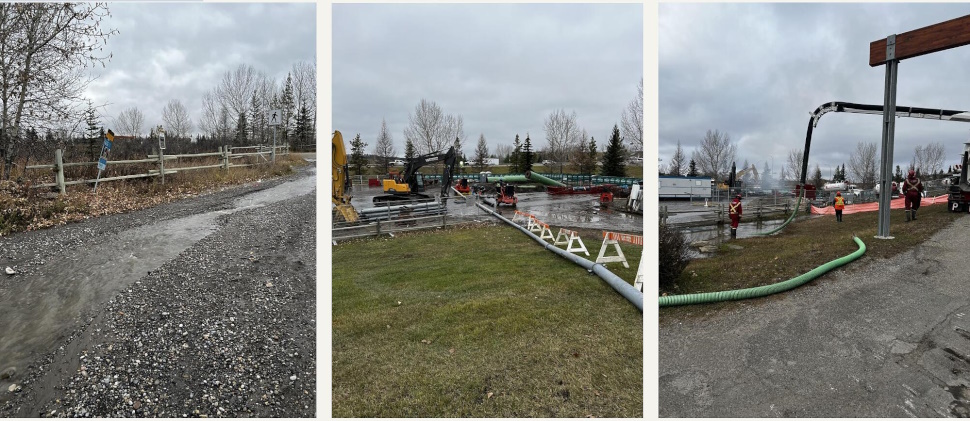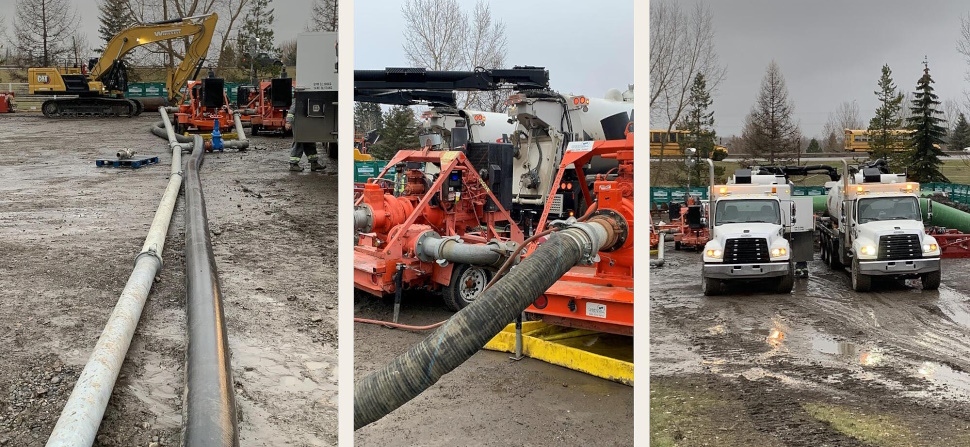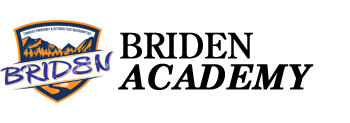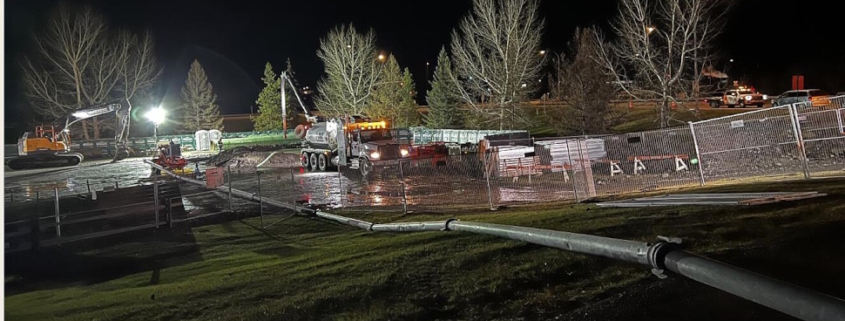Sewer Line Break Emergency: How Preparedness Eased My Life
When unexpected emergencies like sewer line breaks disrupt our lives, they can be a hard reminder of the importance of preparedness. In these situations, the ability to adapt hinges on the readiness of residents and local authorities. In this article, we’ll delve into a real-life example of a sewer line break that led to level 3 water restrictions and discuss how preparation made it easier to live through.
The Sewer Line Break Emergency
Our Alberta Emergency Alert app sounded approx. 8/8:30pm with an announcement about the following (the below is a copy of the letter posted to our town website):
News Flash
Posted on: October 22, 2023
WASTEWATER LEAK CONTAINED ON SITE:
At approximately 6PM last evening, the Town of Cochrane was advised that a contractor completing work on behalf of the Town had impacted our wastewater and water pipelines as they were setting up for drilling operations.
This impact was adjacent to the Bow River.
As a result of this impact, wastewater was discharging directly into the Bow River. Cochrane’s drinking water was not impacted and remains safe.
Crews were on site throughout the night working on mitigation and containment efforts. As of early this morning, wastewater is no longer entering the river and is being contained on site. [This was later amended to say that this was not true and crews were still working on containment]
At approximately 8:30PM last evening, the Town of Cochrane activated our Emergency Coordination Centre. Through the ECC, we are in contact with the City of Calgary, Rocky View County, Alberta Environment and Alberta Health Services. Any questions specific to their systems or processes, should be directed to them.

[ Photo courtesy of the Town of Cochrane Cochrane Now ]
In many communities, a sewer line break can quickly escalate into a multifaceted crisis, impacting water supply and posing health and environmental risks. A sewer line rupture can contaminate water sources and necessitate water restrictions to protect public health and ensure water treatment facilities can cope with the added strain.
In my town, this sewer line break prompted a level 3 water restriction notice (and to date has been in effect almost 72 hours). This included directives such as washing dishes by hand, refraining from washing laundry, and avoiding outdoor watering. These restrictions were put in place to ensure that the available water resources are allocated to essential needs and to prevent potential waterborne contamination.
The Importance of Preparedness
- Emergency Kits: Having an emergency kit on hand, including bottled water, non-perishable food, and hygiene supplies, is invaluable during a water crisis. These kits can provide essential sustenance during water restrictions.
- Water Storage: Storing a supply of clean water is a wise pre-emptive measure. This stored water can be used for drinking, cooking, and personal hygiene when tap water is limited.
- Alternative Water Sources: Identifying alternative water sources, such as rainwater harvesting (rain barrels) or nearby bodies of water (if safe and permitted).
- Communication: Stay informed about local emergency alerts and municipal plans. Being aware of the situation in advance allows you to adjust your daily routines and water usage accordingly.
- I had neighbors and friends who had not received the alert. I encouraged them to open the app and update their information for future notifications.
- Education: Knowing how to conserve water effectively is vital. Simple practices like turning off the tap while brushing teeth or fixing leaks promptly can make a significant difference during water restrictions.
- Community Support: Building a sense of community and cooperation can be a lifesaver in emergencies. Neighbors can share resources, information, and support one another during times of crisis.
Communication:
In our town, I was very happy to receive such thorough information. Residents received the following recommendations:
Under a level 3 water restriction, outdoor water use is prohibited, water pressure will be reduced as required, and bulk water sales will not be permitted.
In addition, residents are requested to:
- Use water sparingly: Limit water use to only essential activities.
- Reduce shower time: Shorten shower times to conserve water.
- Wash dishes by hand: If you have a dishwasher, only use it when you have a full load of dishes to wash. Hand wash where possible to limit water use.
- Limit laundry: Postpone doing laundry until the water line impacts have been resolved.
- Educate family members: Ensure that all members of the household are aware of the current situation and are following the conservation guidelines.
“By making simple adjustments to your daily routines, you can significantly contribute to the preservation of our water resources,” said Stacey Loe, Director of Emergency Management, Town of Cochrane. “Your cooperation is greatly appreciated as we work together to protect our water resources.”
More Ideas to Restrict Water Use in Case of an Emergency
During a water restriction, conserving water is essential to ensure you have an adequate supply for essential needs and to support the community’s efforts to manage the situation. Here are some examples of things you can do at home during a water restriction:
Bathroom:
- Limit Showers: Take shorter showers and consider using a timer to help you keep track of your water use. Turning off the shower while soaping can save a significant amount of water.
- Use a Water-Saving Showerhead: Install a low-flow or water-saving showerhead to reduce water consumption while maintaining water pressure.
- Collect and Reuse Water: Place a bucket in the shower to catch excess water while waiting for it to heat up. Use this “gray water” for tasks like flushing toilets or watering plants.
- Toilet Conservation: If you have a dual-flush toilet, use the lower flush setting for liquid waste.
*The Town of Cochrane has a rebate available for installation of water efficient appliances and home products. Check your local available options.
Kitchen/Home:
- Dishwashing: When washing dishes, fill the sink with soapy water instead of letting the tap run continuously. Scrub and rinse all dishes together to minimize water use. Consider using paper plates or disposable utensils sparingly to reduce dishwashing.
- Laundry: Avoid doing laundry during the restriction if possible. When you must, make sure to have full loads.. Using a high-efficiency washing machine also reduces water consumption.
- Hand Washing: In situations where washing hands is essential but water is scarce, use hand sanitizer as an alternative.
- Cooking: When preparing food, minimize dish use. Steam or microwave vegetables instead of boiling them, which uses less water.
- Gardening: Avoid watering your garden during water restrictions. If you have potted plants, consider using collected rainwater.
- Educate Your Household: Ensure that everyone in your household is aware of the water restrictions and the need to conserve. Encourage family members to follow these guidelines.

[ Photo courtesy the Town of Cochrane ] Cochrane Now
In conclusion!
This real time experience is a perfect example on being prepared without it being an instance with zero water sources. I was able to sit my kids down and explain to them that until further notice we are going to shower a little less, avoid starting the washing machine and dishwasher, and being cautious of how much water we are using. We were ready with water storage and they were eager to be creative and to help our community! The little things like not running the water while brushing teeth are a simple way of being responsible citizens in our community during that time. Stay safe!



